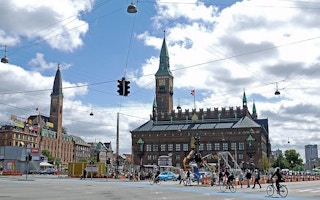With many countries increasingly adopting green growth as an economic model, experts speaking at the Green Growth Business Forum in Singapore last week outlined how technological solutions can help to drive this transformation.
Often used interchangeably with green economy, green growth is a path of development that reduces climate risks. It promotes the production and use of low carbon technologies and solutions such as renewable energy.
In opening the event at Marina Bay Sands, Scott Wightman, UK high commissioner to Singapore, noted that the global market for green economy is estimated to have grown by around 4 per cent a year since 2013.
Keynote speaker Copenhagen’s mayor for environmental and technical affairs, Morten Kabell, shared that to achieve Copenhagen’s carbon neutral goal by 2025, the city is focusing on solutions that will keep it “compact, coordinated and connected”.
This will not be easy but “sustainability challenges present us with opportunities,” noted the mayor. Copenhagen recently opened the Street Lab, for instance, which is a ‘test area for smart city solutions in real urban space’ and based on public and private partnerships.
The lab is at the heart of Copenhagen at the City Hall Square, which offers a suitable testing area to try out a wide set of solutions such as smart parking and air quality and noise monitoring technologies, among others.
“This is an example of creating labs and opening the city to companies around the world to test their solutions, while creating an environment where the city dwellers are part of the experiments,” he said.
And to make the lives of citizens easier, 20 per cent of existing housing in the city centre is allocated for affordable social housing. This ensures that the wider public like school teachers, police officers, and nurses do not need to commute for hours to get to work.
“
It is crucial to share knowledge, know-how and results across cities, worldwide, because the green economy is not just about growth, it’s about creating a better world and liveable cities.
Morten Kabell, mayor, environmental and technical affairs, Copenhagen
Kabell mentioned that Copenhagen is planned to be a dense city as big cities open up many benefits like diversity and multi-culturalism, among others. “We have ensured density and will continue to do so,” he said.
The city has also adopted district wide heating and cooling systems, which reduces the need to use individual air conditioners and heaters, thereby saving energy in the process.
Speakers at the event also emphasised the urgent need for companies to develop low carbon technologies, such as solar, wind, biofuels and hydrogen, and adopting carbon pricing, which puts a price on carbon emissions.
Mark Gainsborough, executive vice president of New Energies at Shell, shared that the energy giant focusing its long term strategy to develop low carbon technologies and business models, and will be increasingly combining renewable energy with fossil fuels such as oil and gas.
The push comes from the realisation that the company needs to move towards net zero emissions target by the second half of the century. This is important for Shell because green growth equates to business growth, he said.
Gainsborough further noted that “if you want to be net carbon zero emissions by 2050 rather than 2100, carbon pricing will be key to drive the low carbon faster, in addition to policies for driving the transitions”.
So what should the price be? He suggested that the carbon price should be around US$40 to 50.
Kabell emphasised that “it is not expensive to go green, that’s a myth and must be stopped”. From 1995 to 2015, there was a 30 per cent increase in Copenhagen economy and at the same time the greenhouse gas emissions decreased by 50 per cent, he said.
For green growth solutions to materialise, “it is crucial to share knowledge, know-how and results across cities, worldwide, because the green economy is not just about growth, it’s about creating a better world and liveable cities,” said Kabell.
The Green Growth Business Forum, held in Singapore from 12 to 13 July 2016, explored low carbon growth opportunities and challenges in Singapore and South East Asia. The forum is a partnership between Singapore and United Kingdom governments.

















